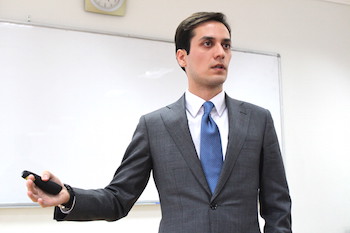- Details
On February 16th, ISET hosted David Bostashvili PhD. from the University of Houston. Dr. Bostashvili presented his job market paper: “Political Budget cycles and Civil Service in American State Governments”. The motivation for this paper was an observation that all levels of government tend to spend budgets right before elections. This phenomenon is known as the “political budget cycle”. Furthermore, evidence of the budget cycles is mostly studied in developing countries. There is a lack of study of this phenomenon in current literature from developed countries. Dr. Bostashvili used the establishment of civil service systems in the United States to study how it effects budget cycles.
- Details
On February 11th, ISET hosted Olivier Harlem, Ph.D. of the Erasmus School of Economics, Rotterdam. Dr. Harlem presented his job market paper, “Earmarks”. Earmarks were U.S. federal funds that are designated for local projects and were easy for local representatives to obtain for their electoral districts. Some of the reasons why earmarks are interesting is that they are seen as: (i)”[a] symbol of broken spending”, (ii)”[a] gateway to corruption” and (iii) a “political carrot for speeding up [the] legislative process”. From an academic point of view, studying earmarks is interesting, as they reflect the aspects of both politicians’ behavior and the impact of public funds on the electoral process.
Dr. Harlem used specifications from Grossman and Helpman’s model to build the essence of his empirical approach.












